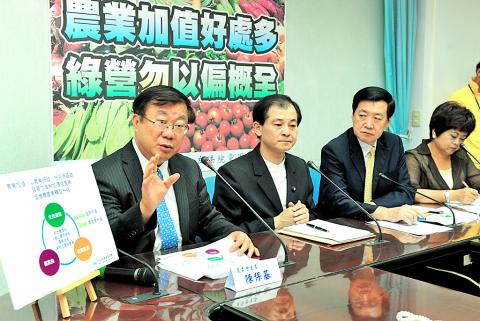The government’s free economic pilot zone policy is not simply about lifting the ban on 830 Chinese agricultural products, but is aimed at broadening Taiwan’s global reach, Council of Agriculture Minister Chen Bao-ji (陳保基) said yesterday.
With the legislature expected to review the draft bill on the pilot zones during the last week of the three-week-long legislative extraordinary session, Chen, accompanied by Chinese Nationalist Party (KMT) legislators, called on the public and opposition lawmakers to support the policy.
Chen described the bill as a far-seeing policy aimed at enabling “Taiwan’s [food] processing techniques to shine” on the global stage.

Photo: Lo Pei-der, Taipei Times
The draft bill’s Article 42 has long been the target of criticism by civic groups and opposition parties, which contend that it would allow the import of currently banned Chinese agricultural products to the pilot zones for processing and be exported with the label “Made in Taiwan.”
Chen said that imported raw materials would be examined for food safety in accordance with existing regulations before being processed in the pilot zones. End products that fall under a restricted list can only be exported.
“The policy says nothing about sanctioning the import of banned Chinese agricultural products into the domestic market,” he said, adding that products made in the zone that are not on the restricted list would be taxed before being placed on domestic shelves.
Chen cited the local peanut butter-making industry as a potential beneficiary of the policy. He said that local makers might be forced to exit the market or move abroad if they are not allowed to process Chinese-grown peanuts, one of the currently banned Chinese agricultural products, in the pilot zones and profit from the export of “made in Taiwan” peanut butter.
The minister also underscored the notion of “value-adding,” saying that Taiwan could turn raw agricultural materials from other countries into high-priced products, “just like Switzerland’s chocolate industry and the US’ Starbucks.”
However, academics and Democratic Progressive Party (DPP) legislators have said that processors at the pilot zones could favor cheaper imported agricultural products, thus posing a threat to the domestic agricultural industry.
The DPP yesterday said that the policy would only “support Chinese agriculture” and nip Taiwanese agriculture in the bud.
National Taiwan University professor Wu Jung-chieh (吳榮杰) told a press conference in the legislature on Monday that allowing 830 types of agricultural products from China into the pilot zones would be like “punishing those factories that specialize in processing local agricultural products.”
Wu added that “value-added agriculture” would only benefit a few people.
National Chung Hsing University economist Chen Chi-chung (陳吉仲) said that peanut butter made with Chinese-grown peanuts would not be restricted from domestic sales, and it remains a problem how they would be taxed if they were labeled “Made in Taiwan.”
Taiwan Rural Front secretary-general Frida Tsai (蔡培慧) said that citing insufficient local supply as a reason for allowing agricultural imports does not hold since “there are 270,000 hectares of agricultural fields lying fallow.”
The academics demanded a public debate with the Council of Agriculture.
Chen yesterday said he was willing to accept the invitation if the party caucuses call one.

CHANGING LANDSCAPE: Many of the part-time programs for educators were no longer needed, as many teachers obtain a graduate degree before joining the workforce, experts said Taiwanese universities this year canceled 86 programs, Ministry of Education data showed, with educators attributing the closures to the nation’s low birthrate as well as shifting trends. Fifty-three of the shuttered programs were part-time postgraduate degree programs, about 62 percent of the total, the most in the past five years, the data showed. National Taiwan Normal University (NTNU) discontinued the most part-time master’s programs, at 16: chemistry, life science, earth science, physics, fine arts, music, special education, health promotion and health education, educational psychology and counseling, education, design, Chinese as a second language, library and information sciences, mechatronics engineering, history, physical education

DEADLOCK: As the commission is unable to forum a quorum to review license renewal applications, the channel operators are not at fault and can air past their license date The National Communications Commission (NCC) yesterday said that the Public Television Service (PTS) and 36 other television and radio broadcasters could continue airing, despite the commission’s inability to meet a quorum to review their license renewal applications. The licenses of PTS and the other channels are set to expire between this month and June. The National Communications Commission Organization Act (國家通訊傳播委員會組織法) stipulates that the commission must meet the mandated quorum of four to hold a valid meeting. The seven-member commission currently has only three commissioners. “We have informed the channel operators of the progress we have made in reviewing their license renewal applications, and

The High Prosecutors’ Office yesterday withdrew an appeal against the acquittal of a former bank manager 22 years after his death, marking Taiwan’s first instance of prosecutors rendering posthumous justice to a wrongfully convicted defendant. Chu Ching-en (諸慶恩) — formerly a manager at the Taipei branch of BNP Paribas — was in 1999 accused by Weng Mao-chung (翁茂鍾), then-president of Chia Her Industrial Co, of forging a request for a fixed deposit of US$10 million by I-Hwa Industrial Co, a subsidiary of Chia Her, which was used as collateral. Chu was ruled not guilty in the first trial, but was found guilty

Taiwan People’s Party (TPP) Chairman Huang Kuo-chang (黃國昌) yesterday appealed to the authorities to release former Taipei mayor Ko Wen-je (柯文哲) from pretrial detention amid conflicting reports about his health. The TPP at a news conference on Thursday said that Ko should be released to a hospital for treatment, adding that he has blood in his urine and had spells of pain and nausea followed by vomiting over the past three months. Hsieh Yen-yau (謝炎堯), a retired professor of internal medicine and Ko’s former teacher, said that Ko’s symptoms aligned with gallstones, kidney inflammation and potentially dangerous heart conditions. Ko, charged with